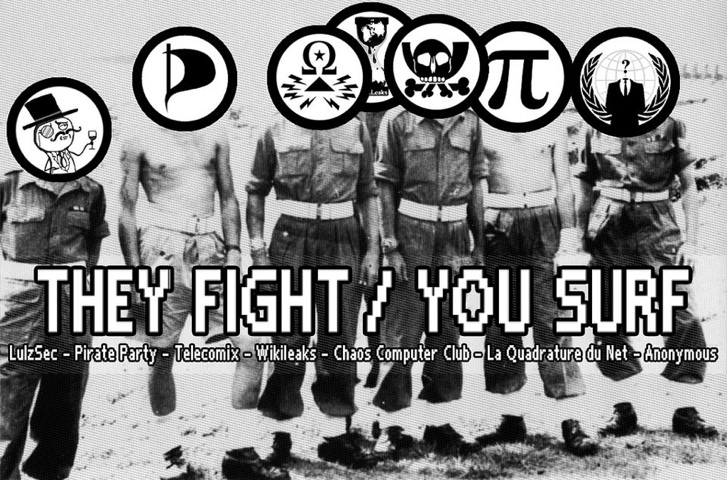Videokamera in der Herrentoilette
Sehr geehrter Datenschutzbeauftragter
Heute schreibe ich Ihnen betreffend folgendem Anliegen:
Mir ist aufgefallen, dass im Innenraum der öffentlich zugänglichen
Herrentoilette des Theaters zum Käfigturm in Bern eine Video-Kamera
installiert ist. Ist dies rechtens? – Und falls nicht, ist dies mit
einer Anzeige bei der Statdpolizei Bern zu lösen?Besten Dank für Ihren kurzen Rat.
Mit freundlichen Grüssen, Lx
Erste Antwort:
Sehr geehrter Herr F.
gerne leite ich Ihnen zuständigkeitshalber die unten stehende Anfrage weiter.
Freundliche Grüsse
B.
Datenschutzbeauftragter
Zweite Antwort:
Sehr geehrter Herr A.
Ich habe Ihre gestrige E-Mail an den Eidgenössischen Datenschutz- und Öffentlichkeitsbeauftragten (Edoeb) weitergeleitet. Da das Theater von einem privaten Betreiber geführt wird, sind wir nicht zuständig. Weitere Angaben und Informationen über den Edoeb können Sie dessen Homepage entnehmen: www.edoeb.admin.ch
Ich hoffe, Ihnen damit gedient zu haben.
Freundliche Grüsse
Fr. B., Mitarbeiterin
DATENSCHUTZAUFSICHTSSTELLE FÜR DIE STADT BERN
Sehr geehrter Herr A.
Wir beziehen uns auf Ihre unten stehende Anfrage betreffend eine Videoüberwachungsanalage im Theater Käfigturm Bern, welche uns zuständigkeitshalber weitergeleitet worden ist. Für Ihre Informationen und Ihr Interesse am Datenschutz danken wir Ihnen bestens und nehmen zu Ihrer Frage gerne wie folgt Stellung:
Grundsätzlich ist es erlaubt, im Privatbereich, z.B. zu Sicherheitszwecken, eine Videoüberwachungsanlage zu betreiben, sofern die datenschutzrechtlichen Bearbeitungsgrundsätze eingehalten werden. Was dies konkret bedeutet, kann in unserem Merkblatt „Videoüberwachung durch private Personen“ auf unserer Website nachgelesen werden. Zum vorliegenden Fall haben wir zudem folgende Bemerkungen:
Bei Videoüberwachungsanlagen auf Toiletten besteht die Gefahr, dass in die Intimsphäre der betroffenen Personen eingegriffen wird. Sollte beispielsweise in die Toilettenkabinen hinein gefilmt werden, wäre dies ein schwerwiegender Eingriff in die Persönlichkeitsrechte der betroffenen Personen, der sich kaum rechtfertigen lässt. Eine solche Videoüberwachung ist daher in der Regel widerrechtlich. Wird dagegen nur der Toilettenvorraum gefilmt, so greift dies weniger tief in die Persönlichkeitsrechte ein, und bei vorliegen eines berechtigten Sicherheitsinteressens am fraglichen Ort kann eine solche Massnahme gerechtfertigt sein.
Jede Videoüberwachungsanlage muss mittels gut sichtbarer Hinweisschilder für die Betroffenen kenntlich gemacht werden. Aus Ihren Ausführungen geht nicht klar hervor, ob dies beim Käfigturm berücksichtigt wurde. Ohne eine solche Kennzeichnung läge ein Verstoss gegen das Transparenzprinzip vor, was ebenfalls zu einer widerrechtlichen Verletzung der Persönlichkeit der Betroffenen führen kann.
Als von den Videokameras erfasste Person habe Sie das Recht, beim Betreiber der Anlage Auskunft über die Videoüberwachung zu verlangen. Sie finden Näheres hierzu auf unserer Website unter http://www.edoeb.admin.ch/dokumentation/00612/00653/00664/index.html?lang=de sowie speziell für Videoüberwachungen (inkl. Musterschreiben) unter http://www.edoeb.admin.ch/dokumentation/00503/00594/index.html?lang=de.
Der Gesetzgeber hat für den privatrechtlichen Bereich (d.h. Bearbeitungen von Personendaten durch Private) vorgesehen, dass die betroffene Person in erster Linie den zivilrechtlichen Weg beschreitet. Gelangen Sie aufgrund der mit dem Auskunftsgesuch erlangten Informationen zur Ansicht, durch die Videoüberwachung im Käfigturm widerrechtlich in Ihrer Persönlichkeit verletzt worden zu sein, können Sie beim für Ihren Wohnort zuständigen Zivilgericht oder beim Zivilgericht in Bern gestützt auf Art. 15 des Bundesgesetzes über den Datenschutz vom 19. Juni 1992 (DSG; SR 235.1) Zivilklage einreichen. Wurden Sie in Ihrer Intimsphäre verletzt, kommt auch eine Strafanzeige (Art. 179quater StGB) in Betracht. Wir empfehlen Ihnen jedoch, sich vor dem Einleiten rechtlicher Schritte anwaltlich beraten zu lassen. In den meisten Kantonen betreiben die Anwaltsverbände Rechtsberatungsstellen, bei denen Sie kostenlos oder gegen ein geringes Entgelt eine Erstberatung in Anspruch nehmen können. Genaueres hierzu finden Sie unter http://www.sav-fsa.ch.
Wir hoffen, Ihnen mit diesen Angaben zu dienen.
Mit freundlichen Grüssen
S.H.
Eidgenössischer Datenschutz- und Öffentlichkeitsbeauftragter EDÖB




